Treatment for coughing
Treatment for coughing strategy depends on the cause of the symptoms. For healthy adults, most treatments for coughing will involve self-care.
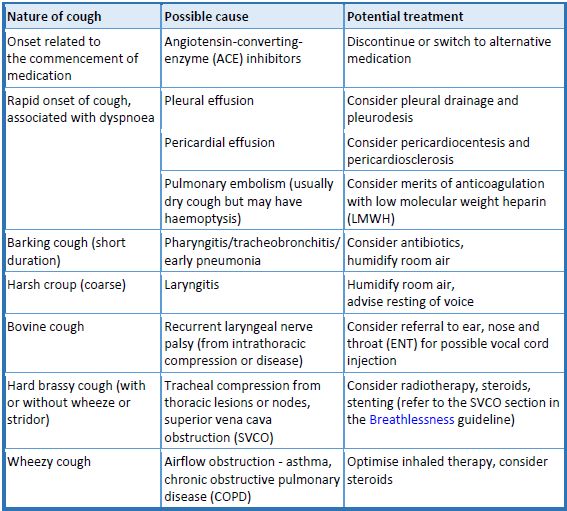
Listed below are some of the most common treatments for coughing:
Medications for coughing
Medicines for coughing are one of the common approaches to the treatment for coughing that is effective to help reduce the symptoms. There are 2 types of medications for coughing: antitussives and expectorants. A common antitussive is dextromethorphan (some brand names: Triaminic Cold and Cough, Robitussin Cough, Vicks 44 Cough, and Cold). The only expectorant available in OTC products is guaifenesin (2 brand names: Mucinex, Robitussin Chest Congestion).
Antitussive medications for coughing are cough suppressants. They relieve your cough by blocking the cough reflex. Expectorants thin mucus. This may help your cough clear the mucus from your airway. Drinking extra fluids also helps keep mucus thin.
Dextromethorphan and guaifenesin are sometimes combined with each other to make a strong complex medicine for coughing. They are also available in combination with other medicines, such as pain relievers, decongestants, or antihistamines. These combination products (such as multi-symptom cold medicines) are meant to treat many symptoms at the same time. However, if your main symptom is cough, be careful of the drying effect of antihistamines and decongestants in combination medicines. This effect can make mucus thicker and harder to clear from the airways, which can make a cough worse.
Inhalers for coughing
Inhalers for coughing is another treatment for coughing that is used to treat asthma caused by coughing. Inhalers for coughing works by relaxing the muscles of the airways into the lungs, which makes it easier to breathe.
Another type of treatment for coughing is a natural treatment.
What is coughing?
Coughing is a common reflex action that clears your throat of mucus or foreign irritants. While everyone coughs to clear their throat from time to time, a number of conditions can cause more frequent coughing. This leads to the question of why am I coughing?
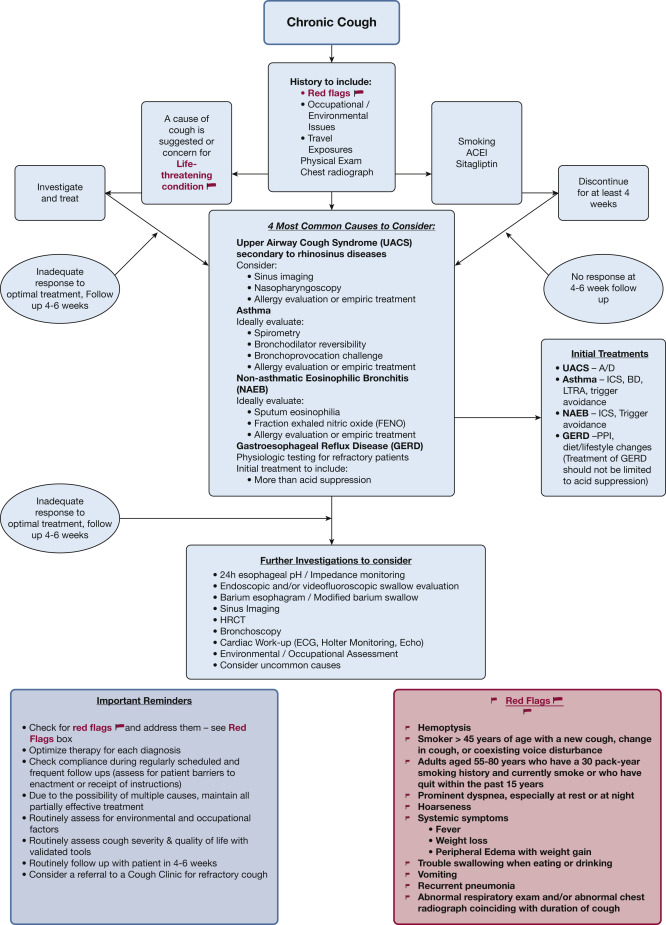
Coughing can happen deliberately or as part of a reflex. Although coughing can be a sign of a serious illness, however, often it will clear up on its own without the need for medical attention.
There are three phases to coughing:
- Inhalation (breathing in).
- Increased pressure in the throat and lungs with the vocal cords closed.
- An explosive release of air when the vocal cords open, giving a cough its characteristic sound.
If somebody coughs a lot, it can be a sign of a disease. Many coughs are caused by infectious diseases, like the common cold, but there are also non-infectious causes. We look at some potential causes in the next section.
A cough that lasts for less than three weeks is an acute cough. Most episodes of coughing will clear up or at least significantly improve within two weeks.
If your cough lasts between three and eight weeks, improving by the end of that period, it’s considered a subacute cough. A persistent cough that lasts more than eight weeks is a chronic cough.
You should see a doctor if you cough up blood or have a “barking” cough. You should also contact them if your cough hasn’t improved in a few weeks, as this could indicate something more serious.
What causes coughing?
The causes of coughing can be based on several conditions, both temporary and permanent. Below are some of the causes of coughing:
Clearing the throat
Coughing is a standard way of clearing your throat. When your airways become clogged with mucus or foreign particles such as smoke or dust, a cough is a reflex reaction that attempts to clear the particles and make breathing easier.
Usually, this type of coughing is relatively infrequent, but coughing will increase with exposure to irritants such as smoke.
Viruses and bacteria
This is one of the most common causes of coughing such as a cold or flu. Respiratory tract infections are usually caused by a virus and may last from a few days to a week. Infections caused by the flu may take a little longer to clear up and can sometimes require antibiotics.
Smoking
Smoking is another common cause of coughing. A cough caused by smoking is almost always a chronic cough with a distinctive sound. It’s often known as a smoker’s cough.
Asthma
Common causes of coughing in young children are bronchitis and asthma. Typically, asthmatic coughing involves wheezing, making it easy to identify.
Asthma exacerbations should receive treatment using an inhaler. It’s possible for children to grow out of asthma as they get older.
Medicines
Some medications will cause coughing, although this is generally a rare side effect. Angiotensin-converting enzyme (ACE) inhibitors, commonly used to treat high blood pressure and heart conditions, can cause coughing.
Two of the more common ones are:
- Zestril (lisinopril)
- Vasotec (enalapril)
The coughing stops when the medication is discontinued.
Other conditions
Other conditions that may cause coughing to include:
- Damage to the vocal cords
- Postnasal drip
- Bacterial infections such as pneumonia, whooping cough, and croup
- Serious conditions such as pulmonary embolism and heart failure
Another common condition that can cause a chronic cough is gastroesophageal reflux disease (GERD). In this condition, stomach contents flow back into the esophagus. This backflow stimulates a reflex in the trachea, causing the person to cough.
Natural treatment for coughing
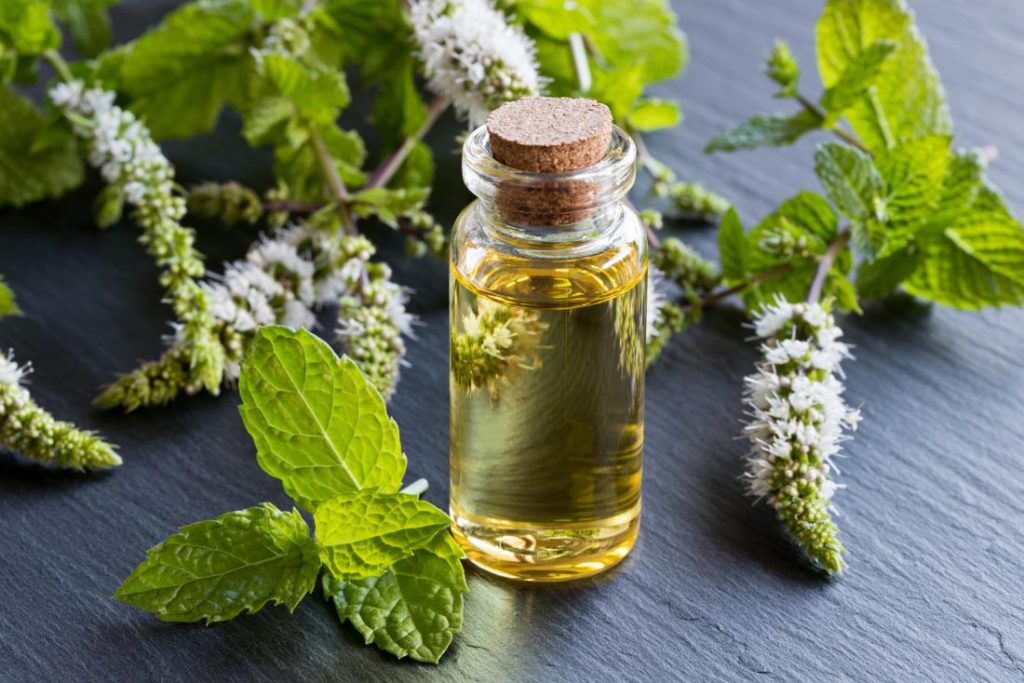
Natural treatment for coughing is another type of treatment that has been proven to be effective without causing any side effects. Below is a natural treatment for coughing:
Home remedies for coughing – most common natural treatment for coughing.
Home remedies for coughing are natural remedies for coughing that can be achieved at home. Below are home remedies for coughing:
- Honey: It coats the throat, resulting in less irritation and possibly less coughing. Honey is a demulcent (something that soothes).
- Ginger: Eating pungent spices, including ginger, cinnamon, and anise, can help strengthen your respiratory system. These spices can be brewed into a delicious herbal tea and the warm water and steam have the added benefit of helping to open up your lungs. Purified ginger put in a nebulizer helped relax people’s airways and reduce coughing, particularly “dry” coughs related to asthma
Below are other home remedies for coughing
- Keep hydrated by drinking plenty of water.
- Elevate your head with extra pillows when sleeping.
- Use cough drops to soothe your throat.
- Gargle with warm salt water regularly to remove mucus and soothe your throat.
- Avoid irritants, including smoke and dust.
- Add honey or ginger to hot tea to relieve your cough and clear your airway.
- Use decongestant sprays to unblock your nose and ease breathing.
Herbs for coughing – an effective and safe natural treatment for coughing
Herbs for coughing is another natural remedy for coughing that is effective, safe, and easy to use. Below are some of the most commonly used herbs for coughing:
Marshmallow
- Marshmallow is a herb for coughing that is made from Althaea officinalis, a perennial that flowers in summer. The leaves and roots of the herb have been used since ancient times to treat sore throats and suppress coughs. The marshmallow herb contains mucilage, which coats the throat and soothes irritation. Today, you can get marshmallow root as tea or in capsule form. The warm tea can be soothing to a cough that’s accompanied by a sore throat.
Boswellia
- Boswellia is an herb for coughing that is known as frankincense and it has been used for centuries to treat coughs, particularly those that come from inflammation of the lungs or other areas. Its potent anti-inflammatory compounds can help both in soothing a cough and fighting the oral pathogens that can cause them. Dissolving Boswellia in hot water and inhaling the steam helped reduce coughing from asthma and bronchitis
Acupuncture for coughing – ancient Chinese natural treatment for coughing.
Acupuncture for coughing is another natural remedy for coughing that is effective. In controlled clinical research, acupuncture outperformed drug therapy for the treatment of coughing following the acute stage of a respiratory infection.
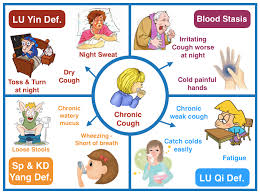
Another investigation finds acupoint herbal plaster therapy effective for improving patient outcomes for children with chronic coughing. In an integrative approach to patient care, acupoint herbal plaster therapy enhanced patient outcomes for children receiving standard drug therapy.
Acupuncture for coughing is more effective for the treatment of coughing compared to drugs.
Homeopathy – #1 natural treatment for coughing
Homeopathy for coughing is based on the use of natural remedies for coughing that are made from natural substances and cause virtually no side effects.
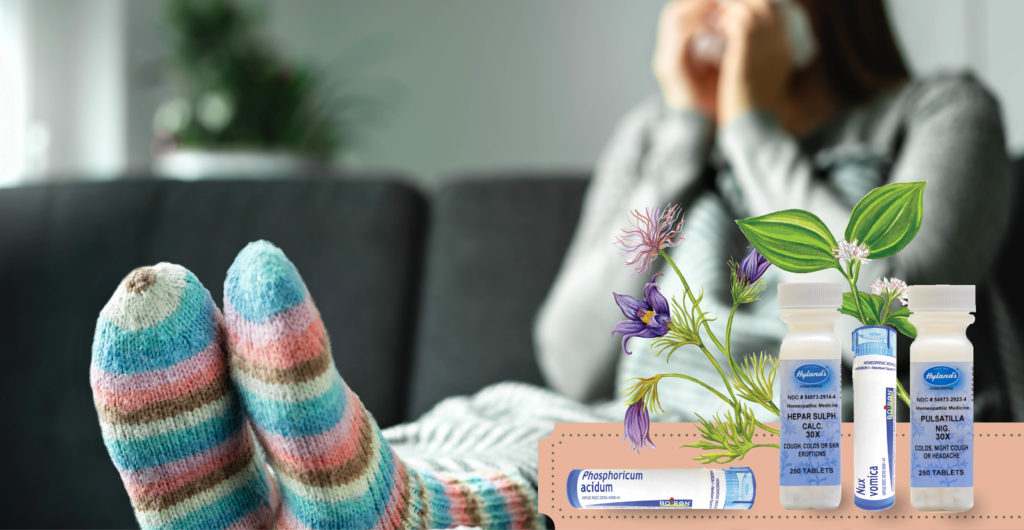
In homeopathic medicine, in particular, when using homeopathic single remedies, accomplishment depends on fitting the patient’s explicit symptoms to the remedy’s description. The key here is to focus on the nature of coughs in some key homeopathic remedies and in turn, look toward specifying the cough you are treating. Does the cough wake you up at night? Are your coughing dry or wet and you are able to spit mucous? Any rattling or breathlessness? Does the mucus clog your bronchioles, or it comes up when you are coughing?
Below are the most common and effective homeopathic remedies for coughing
- This medicine is prescribed in the early stages of cold and cough after exposure to cold or dry weather. It is usually given in the first 24 hours of high fever and restlessness.
This remedy is indicated when a cough has come on suddenly—often from exposure to cold wind, or after a traumatic experience. The cough is likely to be sharp, short, dry, and constant. It may begin during sleep and wake the person up or can start when the person goes from a cool place into a warmer one. Restlessness and fear are typical when this remedy is needed. It is often used in the early stages of croup and asthma.
- Allium cepa is for treating streaming cold accompanied by sneezing and watery eyes. This medicine is effective in treating cold when the person’s eyes are not burning, but the discharge from the nose is.
- If you are frequently sneezing, your nose is irritating and tickling, then the homeopath may prescribe you Arsenicum Album. This medicine is also effective in treating throbbing frontal headache, burning chest pain, restlessness, and fear.
- Euphrasia is prescribed for the treatment of coughing associated with burning discharge from the eyes. This can help to cure swollen eyelids and cough that intensifies during the daytime.
- This homeopathy medicine is effective in treating the beginning stages of all inflammatory problems, red burning eyes, restless sleep, weakness, and excessive thirst.
- Gelsemium is prescribed for a cold with flu-like symptoms e.g. body ache, heaviness throughout the body, fatigue, restlessness, and chills. In those situations, Gelsemium is one of the best homeopathic remedies for treatment for coughing
- This medicine is used for the treatment of cough during later stages of cold and nasal discharge. It is also effective on other symptoms of cold and cough like stubborn congestion, swollen eyelids, or sticky discharge from the nose.
- Mercurius Solubilis is excellent for cough treatment associated with creeping chilliness, frequent sneezing, sore throat, heavy salivation, bad mouth odor, and ear pain.
- This homeopathy medicine is provided to people suffering from dry cough, which increases in the morning or evening or when talking, eating, laughing, or breathing cold air.
- Indications for this remedy in treatment for coughing include a tight sensation in the chest with a dry, hacking, teasing cough—often causing soreness or a feeling that something has been torn inside. Long coughing jags can end in stomach pain and retching and may make the person’s headache. A person who needs this remedy is likely to be impatient, irritable, and oversensitive to everything. A feeling of chilliness is typical, and problems are often worse from exertion (both mental and physical) and worse in the morning.
- This remedy relieves croupy, barking cough, especially after a chill or cold weather, worse when lying down at night.
- This remedy is indicated for burning, irritating coughs that get worse at night in bed, as well as for breathing problems during sleep. It can also be useful when a mild cough drags on for a week or more without getting worse, but without much improvement. Burning sensations, redness of eyes and mucous membranes, foul odors, and aggravation from bathing are often seen in a person who needs this remedy. Sulfur is one of the most important homeopathic remedies and it’s commonly used for treatment for coughing.
Natural treatment for coughing in Philadelphia
Coughing could be a sign of a serious medical condition, such as bronchitis, pneumonia, TBC, or even lung cancer. That’s why rule number one is – do not treat coughing without consulting a physician or get natural treatment at the holistic medical facility that is run by a medical doctor.
If you live in Philadelphia or suburbs contact Philadelphia Homeopathic clinic (267) 284-3085 to schedule an appointment for holistic evaluation and start your treatment.
You can also use our online secure scheduling application or just scan the QR code below.

Comments
Post a Comment